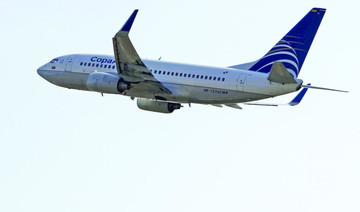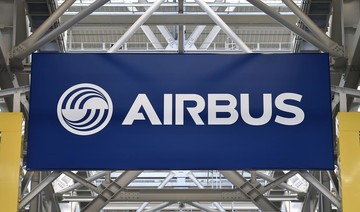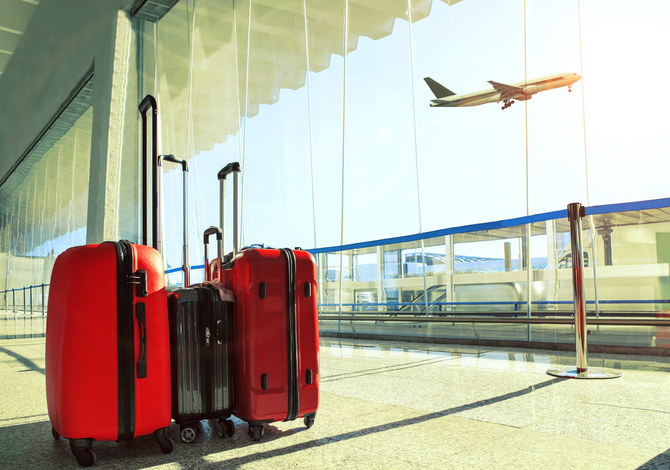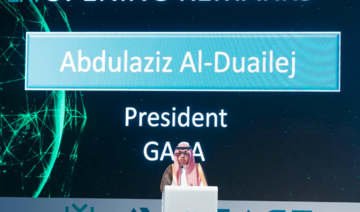LONDON: The Middle East is the worst performing region for airline profitability, with regional carriers’ losses set to deepen this year, an industry report said on Sunday.
Airlines in the region are expected to see a combined net loss of $1.1 billion this year, $100 million more than in 2018, the International Air Transport Association (IATA) said.
That equates to an average $5.01 loss per passenger flown, the poorest forecast for airlines in all six global regions assessed by IATA.
The Middle East “has faced substantial challenges in recent years, both to the business environment and to business models,” the association said in a report.
“Airlines there are going through a process of adjustment and announced schedules point to a substantial slowdown in capacity growth in 2019. Performance is now improving but the worsening in the business environment is expected to prolong losses in 2019.”
The Middle East is also the worst ranked region according to other key metrics tracked by IATA.
Demand growth is expected to be just 2 percent, compared to a global of average of 5 percent, while growth in capacity is forecast at 0.6 percent, versus 4.7 percent globally.
Despite the apparently gloomy outlook, one analyst said the prospects for Middle East airlines — especially the big Gulf operators — was rosier than the headline figures suggest.
“IATA clearly sees the glass as half empty, whereas I see it as half full,” Saj Ahmad, chief analyst at StrategicAero Research, told Arab News.
“(Its) assessment is based on the here-and-now; the long term prospects for the region remain robust given the inherent demand for travel, particularly to gateways like Dubai.
“I disagree that the outlook is gloomy — what we’re witnessing is an evolution to the landscape where for years GCC airlines have been expanding at a frenetic pace. That was when competition was not as brisk. Now that rivals are treading into the same trade space, its not exactly a surprise when airline yields are under pressure and profitability is harder to achieve. This evolution effectively will separate the winners from the losers.”
FASTFACT
$6.12
Forecast average profit per passenger flown by global carriers.
The three big Gulf airlines — Emirates, Etihad and Qatar Airways — were a few years ago accused by US rivals of receiving unfair state subsidies, claims they strenuously denied.
Ahmad said that the tougher environment in the Middle East aviation industry suggests that carriers are indeed operating on a level playing field.
“The GCC and wider Middle East region has long been accused of having airlines backed by states and thus making them immune to the dynamics of the market they operate in. Clearly, that’s not the case,” Ahmad said.
“The restructuring of loss-making Etihad, the competitive challenges facing Emirates, flydubai, Air Arabia and others proves that economic realities afflict airlines here as they do in Asia, Europe and the US.”
The IATA report — published to coincide with the association’s annual general meeting in Seoul — also pointed to turbulence in the global aviation industry, amid worries over an expanding trade war and higher oil prices.
Globally, airlines are expected to post a combined $28 billion profit in 2019, lower than a December forecast of $35.5 billion, IATA said.
The industry’s profit per passenger flown is seen declining to $6.12 this year, from $6.85 in 2018.
------
THE LIST
Airlines’ net profit/loss by region
North America — $15 billion profit
Europe — $8.1 billion profit
Asia-Pacific — $6.0 billion profit
Latin America — $200 million profit
Middle East — $1.1 billion loss
Africa — $100 million loss
------
“Airlines will still turn a profit this year, but there is no easy money to be made,” said Alexandre de Juniac, IATA’s director general and CEO.
“Margins are being squeezed by rising costs right across the board — including labor, fuel, and infrastructure. Stiff competition among airlines keeps yields from rising. Weakening of global trade is likely to continue as the US-China trade war intensifies. This primarily impacts the cargo business, but passenger traffic could also be impacted as tensions rise.
“Aviation needs borders that are open to people and to trade. Nobody wins from trade wars, protectionist policies or isolationist agendas. But everybody benefits from growing connectivity. A more inclusive globalization must be the way forward.”
Despite the downward revisions to the global forecasts, de Juniac said airlines had “broken the boom-and-bust cycle” — but added that risks remain.
“A downturn in the trading environment no longer plunges the industry into a deep crisis,” he said.
“But under current circumstances, the great achievement of the industry — creating value for investors with normal levels of profitability is at risk. Airlines will still create value for investors in 2019 with above cost-of-capital returns, but only just.”






















